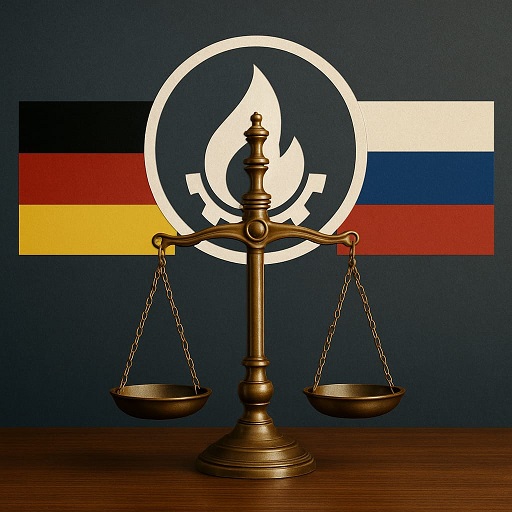On 9 September 2025, the Moscow Arbitration Court published its full decision on the application for an injunction prohibiting any continuation or maintenance of the arbitration proceedings in relation to Wintershall Dea. This will be examined in more detail below.

I. Introduction
On 9 September 2025, the Moscow Arbitrazh Court published its full decision on the application for an injunction prohibiting any continuation or maintenance of the arbitration proceedings in relation to Wintershall Dea.
In its significant ruling (Case No. A40-92702/2025-56-674), the court prohibits the continuation of arbitral proceedings brought by Wintershall Dea GmbH against the Russian Federation before the Permanent Court of Arbitration (PCA) in The Hague under the threat of a penalty of EUR 7.5 billion against Wintershall Dea, but also against the lawyers and the arbitrators themselves.
The case arose under the Energy Charter Treaty (Lisbon, 17 December 1994), with Wintershall challenging the Russian Federation’s presidential decree of 19 December 2023 (No. 965 and 966), which imposed special economic measures in the energy sector in response to “unfriendly actions” by foreign states and international organisations.
KDB.legal already reported on the initiation of those proceedings in April 2025. That article can be found here.
II. Factual Background
Wintershall Dea, represented by the German law firm Aurelius Cotta, initiated arbitration proceedings before the PCA in December 2024, arguing that the decrees effectively frustrated its cooperation with Gazprom PJSC. Initially, the arbitral tribunal was composed of Charles Poncet (Switzerland), Hamid Gharavi (France/Iran) and Olufunke Adekoya (Nigeria). Mr Gharavi withdrew in May 2025.
The Russian Prosecutor General’s Office petitioned the Moscow Arbitrazh Court to prohibit Wintershall, Aurelius Cotta and the remaining arbitrators from pursuing the proceedings. The Prosecutor General based his arguments on Art. 248.1 and 248.2 of the Arbitrazh Procedure Code of the Russian Federation (APK). These notorious provisions give the Russian Arbitrazh Courts “exclusive jurisdiction” over disputes involving Russian parties subject to foreign sanctions.
III. Legal Reasoning
The court prohibited Wintershall Dea GmbH, Aurelius Cotta, their representatives, successors, and beneficiaries from continuing or supporting the PCA arbitration. Also, it is prohibited for the remaining arbitrators, Poncet and Adekoya, to request evidence, hold hearings or issue awards in the PCA case.
In the event of non-compliance, the court ordered monetary penalties of EUR 7.5 billion against each of Wintershall, Aurelius Cotta and (jointly and severally) the arbitrators Poncet and Adekoya. The ruling may be appealed to the Moscow Arbitrazh Circuit Court within one month.
The Arbitrazh Court based his decision on the already known and proven arguments:
- Exclusive Jurisdiction
Under Art. 248.1 APK, Russian arbitrazh courts have exclusive jurisdiction where Russian parties are affected by restrictive measures of foreign states or unions (including the EU, UK, US and Switzerland).
- PublicPolicy and Sovereignty
The court emphasised that foreign sanctions cannot affect Russian legal entities’ rights within Russia, invoking the 1965 UN Declaration on the Inadmissibility of Intervention in the Domestic Affairs of States.
- Sanctions and Access to Justice
Citing rulings of the Supreme Court of the Russian Federation (e.g. Decisions No. 309-ЭС21-6955(1-3) dated 9 December 2021 and No. 307-ЭС23-4890 dated 4 July 2023), the court reiterated that the mere imposition of sanctions suffices to bring a dispute under Russian courts’ exclusive jurisdiction, as sanctions impair access to justice abroad.
- Illegality of Sanctions-Based Claims
The court held that claims contingent on compliance with unilateral sanctions regimes cannot be afforded judicial protection in Russia.
IV. Implications
This ruling underscores the Russian judiciary’s increasingly assertive stance in shielding domestic interests from international arbitration based on the Energy Charter Treaty, especially in light of Western sanctions. The imposing of massive financial penalties not only on the claimant and its counsel but also on arbitrators themselves, the Moscow court has once again reaffirmed Russia’s judicial pushback against foreign dispute resolution mechanisms.
Once again, the ruling may further complicate the enforceability of arbitral awards against Russia abroad, as it creates an additional layer of legal risk for parties and arbitrators engaging in treaty-based arbitration involving Russian measures taken under the category of “counter-sanctions”.
V. Conclusion
As the period to file the appeal is still ongoing, chances are high that this ruling will be appealed. However, it can be said that this will not be the end of this case. Neither the present case nor the one at the PCA.

